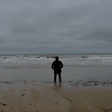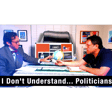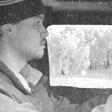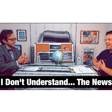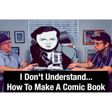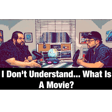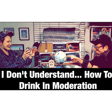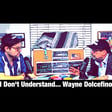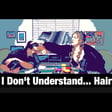Become a Creator today!Start creating today - Share your story with the world!
Start for free
00:00:00
00:00:01

I Don't Understand... Cities
In this first episode of I DON'T UNDERSTAND we have my very smart Cousin David Shannon on to discuss cities. Will I learn anything? We'll see!
Recommended
Transcript
Introduction to the Podcast
00:00:00
Speaker
You ever see this like animation about how OJ did it? It is so fucked up. It's way worse than you think. Hi, my name is Sam Fickman. Welcome to the I Don't Understand podcast. We have my cousin David Shannon. He's one of, if not the smartest man I know. I go through my life sometimes feeling like I just don't know what is anything. You look up at the moon and you're like, oh no, nothing makes sense. What is that? You're just going about your day and you look up and then outer space is above you and you realize you just don't really know what's going on and we're never gonna know. And it's a little frustrating because it's infinite, but then it's not, but then it is. How it how does it end? Where did it begin? so
00:00:37
Speaker
You look at things like that, the moon, and you go, oh, I don't understand anything then because, or at least I do, because I feel very small and insignificant, but I want to have a podcast. Okay.
Sam's Personal Anecdotes and Goals
00:00:49
Speaker
I'm a guy who doesn't know things and I'm here to learn from people who do. You might know me from Being an Extra and Paul Blart 2, Being an Extra and She's the Man, Being Jag as a Child. Here's a clip.
00:01:07
Speaker
What was on the TV there? why were What was I watching? What was there? It's just horrors on TV. It was supposed to be my dad's funeral. And she was actually crying. She was imagining her real husband dead, she told me.
00:01:28
Speaker
She had a photo of her real husband in her sleeve, and she was thinking about him dying. Those are not credits that are good enough for cameo, but they are good enough for a podcast. So here we go. The goal all of the podcast is for me to understand at least one thing. I don't understand the internet lately. ah Facebook, people will post something. They'll say, like, farewell, Richard Gere. And I get nervous that, well, ah Richard Gere is going to die, OK?
00:01:51
Speaker
Richard Gere's gonna die. This is terrible. Then you click on it, and it's farewell. It's about, he's selling his house in Connecticut, and he's moving to Spain, and he's... So, farewell. Who was saying farewell? It was farewell from the point of view of his house. His house was saying farewell. He...
00:02:08
Speaker
Also, while we're here, I think that the room where Richard Gere has a gerbil of his butt started, because his last name kind of looks like gerbil, if you think about it. How do you make sure, how when you take a shower, do you make sure that your ah bath, your your bathroom doesn't become the wettest place of all time?
00:02:26
Speaker
I feel like when I was like first showering and like. I'm not first showering. I know. Well, with with the curtains. I think my first apartment that had the curtains instead of like a door that you close. I know. I would keep those. You know, there's like the inner curtain that you keep in the shower and then the other one outside. I think I used to keep them both outside. inner curtain. You keep one that keeps like the inner curtain. I know about the inner curtain. Yeah. Yeah. That's how I tend to do it.
00:02:55
Speaker
How to dance, I don't understand that. How to understand rhythm in general, music. How to do a push-up. I would like to learn how to do a real good pushup that like an army general would be like, yes, that is the one I told you to do. if i told I told him to do 50 and those were 50 of the right ones. They say older siblings are the original influencers. I was not blessed with that. Instead, I was lucky to have older cousins to help guide
David's Childhood and Intelligence
00:03:21
Speaker
me. My cousin David was the first boy I knew to wear glasses. Ever since then, he has been smart to me.
00:03:29
Speaker
When my cousin David was little, he read the encyclopedia, A to Z. Did you actually read the encyclopedia when you were a little? I did. When we were kids, we called him the professor. Did you like that? Was that bullying and... death But it was like, kids are smart and glasses. It was the last. Yeah, no, I appreciate that. Are you mad about that? No, no. I like the name. I did, looking back at those photos with the 90s, the big, you know, Coke bottle that glasses were a little much, but I like the name. You look perfect. Yeah. You look perfect then and you look perfect now. He travels around the globe. He's gone from city to city. How many cities have you been to?
00:04:05
Speaker
A few hundred cities, I would guess, to me. They say older siblings are the original influencers. Okay, I did that. And do they even say that? I don't know. i Say it now. What was the first city you've ever been to? I was born here in Houston, Texas. Oh, is it a dumb question? One thing about you, you know how to travel chic. What's your secret to that? And tell me now. Having Google Flights and just playing around with like the dates, a lot of people complain about like Spirit and Frontier, but they serve their purpose. If you know what you're getting into and you just like don't need a big suitcase, then you can make it work. I don't need a big suitcase.
00:04:45
Speaker
But urbanism is kind of that quality of having the walkability, the public transportation, the density, um sort of the vibrancy that makes cities spark and have that sort of charm. And that's why Manhattan today is sort of, you know, seen as kind of the pinnacle of urbanism.
Urbanism and City Living
00:05:03
Speaker
After living in Houston and Austin, I studied abroad in Buenos Aires.
00:05:08
Speaker
And that was the first time I experienced sort of a real you know urban experience where I walk outside my door and there's cafes, restaurants, bars, parks, museums. It's all just right there. You don't need to sit in traffic and get on a freeway for 20 minutes. So that kind of opened my eyes, I would say, to what a city could be. David, you always say that you think a city needs to be walkable, a place where people can walk. ah So going back to sort of the history of cities,
00:05:37
Speaker
Walkability was something that was inherent to every city, right? Humanity, if you go back, humans came around 300,000 years ago. ah For the first 90% of that time, humans were living in what we call hunter-gatherer societies. In North America, that meant following like the buffalo around and picking berries and living in small small groups of people. When agriculture came, that allowed for cities to develop around 10,000 years ago.
00:06:04
Speaker
that allowed people to stay in one place for a long time. So with that they didn't need everyone to spend their day gathering berries. So there was enough of a food surplus for people to stay in one place.
00:06:16
Speaker
and that allowed for people to specialize in different things. There were jobs, you get people like, oh, I'll be the doctor here. I'll be the berry-gatherer because I was already doing that, and I'm really good at it. right For the vast majority of humanity, even today in a lot of countries, yes most people are still agricultural workers. They live in rural areas. what What is the first city? What was the first city? The first city that we know of, you know there's still archaeological discoveries, but happened in an area called the Fertile Crescent.
00:06:44
Speaker
Mesopotamia is another word for that and it's basically in today parts of Turkey, Syria, and Iraq and that was where the first city they think was called Uruk, like U-R-U-K. Okay. Today we think of that region as being like the desert basically so it seems surprising that like why would the first cities be there? It wasn't always a desert? It wasn't yeah so back then... Only 10,000 years ago?
00:07:08
Speaker
Yeah, they they yes they say that it has changed a little bit over time. So it used to be more of like a, ah they call it fertile crescent. Yeah. So fertile, like mean... Fuckable. ... crops are able to grow fertile. The fuckable crescent. fact all of The crops were fuckable. F. Mary Kiel, I'll fuck the crescent. you know you could go to certain parts of the world like Pompeii and you see that there's ruins. I don't think a rook is, like, ah active. What happened in Pompeii? What was that? A volcano? Pompeii was, yeah, the volcano. And they froze in ash? I just caught them off guard because it was such a sudden eruption where it just killed people sort of instantly. That can sometimes happen with, what, eruptions or fire? We could just magically turn into stone? There is a thing on the planet that could just turn us into stone?
00:07:51
Speaker
In Houston, I think we're safe from volcanoes, obviously. We're safe, but I'm worried about everyone else. There is, like, a Yellowstone, which we just think of as, like, the national park, and the show, and the Kevin Costner. He is going to kill us all. That is how life will end. What? Is that part of the show? There is something called, like, the Yellowstone, like, super volcano that can, is, like, I think it's active, and I think it will go off at some point. At Yellowstone? Yeah. It's going to, wait, when is that going to happen? The time scale for that is like thousands of years. so something like But it is a problem. But they do think like when that happens it will be like oh beyond like Pompeii was just a city. Like they think the Yellowstone eruption. Where is Yellowstone? Like Wyoming mostly. Why don't people go to Yellowstone and treat it like this family destination if it's just sitting there gonna kill us one day. It sounds like it's our enemy and I hate it now. This is a sweet place where families go but it's gonna kill us?
00:08:44
Speaker
yeah I'll take the odds that we're gonna be safe. Yeah, yeah. i mean We think he's a running back. We just think he's a national park. And then you look up one day and the Yellowstone is stabbing you. It will, yeah, stab him. It's a neck. Stabbing at is? It's not even very intimate. And if you go back in history, that's like, you know, violence is a big part of human history. so it since personal Violence is a part of history. we We should not have been surprised by OJ.
00:09:12
Speaker
Wait, what
Transformations of Cities
00:09:13
Speaker
planet was Hay Arnold on? What city was that? That was urbanism. What can Houston do or another city to make it more Hay Arnold-esque? Those cities do exist. I would say in the North American context, there's fewer of them because we transformed our cities in the 20th century to be so oriented around cars. Americans have been thrown into a state of amazing mobility with freeways for automobiles and buses crisscrossing in all directions. Sure, it has its advantages. you could go, where you know, much farther distances and everything, but the downside to that for cities, you know, highways were built where you used to be kind of walkable, dense urban neighborhoods became hollowed out by
00:09:57
Speaker
cars. The forward-looking city is conscious of the automobile and automobile traffic as key factors. That post-World War II generation, people came back from the war. They wanted to have the white picket fence and the backyard and everything. People sort of fled to the suburbs. Like so many people these days, we live in the suburbs. Which is great, right? I mean, you have your backyard, you have your space. And Dave needs the car every day for business. You've reached a certain point where people are commuting like you know, two hours to go to their office downtown, where I think you've reached the limit of how much a city could sprawl. In the 50s, when they were building the interstate freeway system, they weren't. Basically, they picked people that didn't have much political power and they would run the freeways through those neighborhoods. oh Dodger Stadium in l LA is kind of a famous example of that, where they
00:10:48
Speaker
they like tore down a working class Mexican-American neighborhood to build Dodger Stadium. Was that voted on or just decided by like a dictator kind of guy? In the 1940s and 50s, there were sort of this like urban renewal projects were very in vogue. And that's when they sort of built freeways that cut through cities and they had all these plans to, you know, at the time they would say improve cities, but really there was a lot of, um you know, what they what we call redlining and where they would run highways through neighborhoods, mostly working class.
00:11:21
Speaker
And so that was something that damaged it. Who decides this shit? Who's the one who's like, we're going to use your neighborhood as a baseball park now? What do evil ass like bad guy does that? Yeah. So the history of that is, is pretty, it's pretty unfortunate. What about Detroit? You were telling me about how I had a boom, a fallout, a haul, the whole, one city could have its own like ups and downs and go about Detroit. So Detroit is, you know, synonymous with the US auto industry.
00:11:49
Speaker
During the 1950s, going back again to World War II, Europe and Japan were decimated. So the US was, you know, the only country developed that was making cars. And once more, the automobile factories are humming as huge stamping presses form the bodies of the first automobiles produced since the spring of 1942. So Detroit sort of had like a monopoly on the worldwide car industry.
00:12:15
Speaker
and it was all in Detroit. So I think if you look in like the 1950s through the 60s, Detroit was the richest city in the world. ah The average income of People in Detroit, they had the most disposable income. It was, you know, a city of the future. And also in all those fifties, things were like, welcome to the world of the future. And that was Detroit. Those were all filmed in Detroit. Detroit was, yeah, yeah. And that like post-war period, it was it was doing great. Was eight mile there still? And but it was like nice. Like I live on an eight mile. Yeah. so the So the second unfortunate part of the story is then the auto industry had to compete later when Europe and Japan rebuilt and were able to outcompete
00:12:55
Speaker
You know, GM and Ford, and then also a lot of the auto jobs moved to non unionized States in the South. So today a lot of the car industry, you see in like Tennessee and Alabama. So basically Detroit was hollowed out, lost, I think like two thirds of its population.
00:13:11
Speaker
So the jobs went away and then people were not able to live there. They moved to places like Houston. I know talking to our parents, they say like, are they from Detroit? No, but I've heard I've heard my mom say this like in the 80s from Detroit. No, but they would say like,
00:13:26
Speaker
If you drive on the freeway in Houston, they would say like every other car had like a Michigan license plate. So Detroit was the city of the future in the 50s and 60s, but you go into the 80s and it's like, in movies, it's like, welcome to hell, Detroit, it's bad and scary. Yeah, that's the story of Detroit. So how does it bounce back after the 80s when it's, and it hasn't bounced back? Yeah, it has. Yeah, so not, it's not, you know, the- Are you all good, Detroit? I don't know. David, tell me. Yeah, so Detroit, I would say,
00:13:55
Speaker
it's It's a good example because it's like an extreme case, but what happened to all cities. So the 70s and the 80s, even if you watch movies, you know, like Taxi Driver in the 70s and you know, cities were kind of seen as like dirty, grimy, dangerous places. And statistics back that up. There was like homicide rates were really high. The 80s, you had the crack epide epidemic into the early 90s, as I would say, when cities started to make their recovery.
00:14:19
Speaker
Part of it was the appeal of cities became something that millennials were more interested in. And honestly, I think you could partially credit like friends and Seinfeld and Sex and the City. Joey, Rachel and Sam? Yeah, i think they I think I mean, this is sort of like not a scientifically proven theory. I like it. It makes sense to me. This is the first thing. I yeah i think i know yeah I think people in our generation grew up seeing cities as you know, our parents may have seen them as like the city of Taxi Driver, where it was like mayhem and chaos and violence. And then, you know, we grew up kind of seeing cities as like, oh, this cool place where people meet and it's like fun lives. And yeah, I think he'll go with Janet Brandt in the big city. Yeah. So that like cultural change happened. And it coincided with the millennials sort of becoming of age to where they were graduating from college and having none of them can afford houses, though. OK, so back then, cities were at their low point. So rents were cheap. So eventually,
00:15:19
Speaker
the downsides of the city. Yeah, there's crime and there's pollution and all these you have those first waves of, I mean, you know, it was weeds growing over buildings, completely empty neighborhoods. So first, you know, the maybe artists or You know, gay people would move into neighborhoods and be the first people to, like, kind of show that it's... Make it good? Like, sort of to invest into the city. Is that how cities start? It's gay people and artists? I mean, when you're talking about, like, urban renewal and sort of... Making a city good again. They are usually... It's... You gotta get, like, the Queer Eye for the straight eye. People have to go in and be like, all right, well, the trees growing on the building gotta go. And we gotta put people back to work.
00:16:10
Speaker
There's some truth to that. I mean, I think, like I said, there's the fine line where like people want to criticize it and be like, oh, it's gentrification, it's all bad. But cities like Detroit, like, OK, the alternative was cities spiraling into, you know, debt crisis and population loss and weeds growing on, you know, dilapidated buildings and no industry. So, yeah, at that point, I think the renewal was a good thing. There are certain cities, I would say,
00:16:39
Speaker
mostly along the East Coast that have maintained sort of that urban pre-automobile, urban fabric, but also, you know, San Francisco, even New Orleans. Why is San Francisco so expensive?
Housing Crisis and Public Spaces
00:16:53
Speaker
Where do they get off, basically? ah So there's a different, a few different factors. San Francisco is expensive, primarily, I would say, because it's where the tech industry is, and that's one of the most lucrative industries.
00:17:07
Speaker
Why is it so hard to buy a house? Why can't I do this now? I have a job. i'm i've I've been employed for a while and I can't own a house. Why? The housing supply has not kept up with the population. um After that 2008 financial crisis, there was sort of the idea that housing was overbuilt. New construction basically stopped and did not really pick up its previous pace up until very recently when There's sort of been a realization that we don't have enough housing for people. I think a lot of the focus and like sort of the media and the news is about the housing crisis. And i it obviously is something that's affecting the whole country, but I do think it's focused more on sort of the coastal states. So, you know, California, New York, Massachusetts, those states have become incredibly unaffordable. The states in what I call the Sun Belt are still relatively cheaper.
00:18:08
Speaker
You know, you do as a... Wait, what's the Sunbelt? What is that? how are The states that... Which ones are those? So, yeah, Texas, Georgia, california even California. Yeah, it's it's cities, it's states that really developed, I would say, post-World War II. Sort of with the advent of air conditioning, honestly, is kind of what made those areas more habitable. Yeah, because it was too hot. Yeah. So, like, nobody... I mean, the population, if you look at, like, Florida,
00:18:34
Speaker
you know, post-World War II is really when all the growth happened. You once said Cleveland is a good city. What did you mean by that? I think the best value if you're looking for, um, be able to afford like a home, not that you could, you would just pick up and leave. I'll pick up and leave. I'll pick up and leave. But I think, um, the part of the country that I'm like sort of a fan of is they call it the rust belt is sort of like, you know,
00:19:01
Speaker
ah derogatory name for it, but the industrial... You're being racist right now on the podcast. We're Cleveland only. But no, these cities that are like Buffalo, Cleveland, Pittsburgh, they sort of have a bad reputation of like these old factory towns and the factory shut down and they've kind of over polluted. And that maybe it was true in like the 1990s, but they've sort of had a renaissance and there's been a lot of growth and, you know, development. What is one thing every city must have?
00:19:30
Speaker
I would say that public spaces are sort of usually the backbone to a city, and that could vary you know in cities like Los Angeles or Sydney or Rio. You have the beaches in New York, it's Central Park, in Houston, Memorial Park, yeah you know theaters, sports arenas. You're saying a place where people can be in congregate. A place where people can be in congregate. And why does that why is that important?
00:19:57
Speaker
because it's The word urban means people, does it? Yeah, I think just having that mix of people is sort of what makes a city a city. It's where people meet and change ideas, exchange ideas. It's where you know almost all modern technology is a result of people getting together and sharing ideas. and The problem, sometimes you'll hear me say negative things about certain cities.
00:20:24
Speaker
Why does Dallas suck so much? Dallas, honestly, we have more in common with Dallas than not. I i don't know about that. Kennedy was just fine when he left here. I don't know what they did with him. He was doing fine. He had breakfast. but ah People are always complaining about like population growth, the booming. There's too many people. And I drive through from Houston to Austin. There's all this empty space. Why aren't we just making new cities there? I see the space everywhere. There's tons of it.
00:20:51
Speaker
Why? I'll make a new city. My preference, actually, instead of just sprawling out and continuing doubling down on the auto, you know, let's double down. on Let's give our city more suburban sprawl. I think on. Yeah. But so the way to we have one Las Vegas. Yeah. OK. So instead of building continuous suburban sprawl where it's just freeways and, you know, Walmarts and yeah are no, no good make.
00:21:19
Speaker
Houston, I guess I would say, to you could fill a lot of housing and inside the loop. And that's a more sustainable way to develop. So you would instead of just covering every rural area between Houston and Austin, I would like to see focus on building more density, more walkability, more public transportation, better parks, better access.
00:21:40
Speaker
for the inner city, you know, neighborhoods. um I think that's a more sustainable and what I was getting at was sort of that um difference between the car oriented cities and then, you know, traditional cities. What's better?
00:21:57
Speaker
I have a preference for firm walkable cities. But there's room, you know, I don't have a family. There's something to be said for the convenience of suburban living. No, say, fuck them, driveable cities. We like walkable cities. If you can't walk, you're not a city. What are you? If you're not a city, what are you, though? You are suburban or rural, I guess. But I would. You're a suburb. I would say they're. I'm a city. You're a suburb.
00:22:23
Speaker
Yeah. and there's There's room for all three, I think. and then There's a third? Over all areas. Oh. Yeah, we we don't have any problems with that. And we're not fuck the country. By the way, I know this is this is just a city episode. I don't understand the country either, and I have friends who will talk about that. I have one who wears a cowboy hat regularly, so you know he'll... Oh, is that racist? Carter looked at me like, you want to go there? Philip Breyff.
00:22:49
Speaker
Y'all talk to me about the country. Future guests. Future guests. I mean, yeah, and we're good about cities to the country. We're not fucked to countryside. We're just, the cities are, this is just the first episode. Don't get mad at me. Help me. That's the message. The rest of the country make fun of us. They're nice to us, right? They all like us. What's your favorite TV show?
Founding Stories and Conclusion
00:23:13
Speaker
don't understand We take place here in Houston. The city of Houston, Texas. Got the sticker to prove it. The city of Houston was founded in 1837 by Augustus and John Allen. The Allen brothers. do You know about these guys, these two doofuses? They acquired a bayou and they sold it as a city. Was that smart? Here we are living in it. Maybe it was a good idea. You think of cities as almost like always being there. Like, you know, it's not antiquity. Houston was just a very like, sort of capitalistic venture. Do cities get made anymore? I feel like I was born and all the cities are here. and we Just accept them. can we How do you make another one? If you have the ah the drive and the vision, I guess you could, you know, found the city. Oh, okay. I don't have that. The city of Houston was purchased for $6,600 in 1836. Now that equivolates to, equivolates? $169,000. You can buy a whole city. So we got John Kirby Allen. He refused to join the Texas Army. You know about this? The founders of this city said, we're not going to do it. We're not going to be part of it. Then they started working for a naval ship. You know what it was called? The Brutus. And guess what? I hear they were engaged in privateering.
00:24:28
Speaker
Meanwhile, John Kirby Allen's brother ah was named Augustus. I mean, you didn't hear it from me. Welcome back to the podcast. Now's the time on the show where we're going to play a little game. Okay, let's take an easy little breather. All right. So we're going to play a game called Guess the Song. David's going to listen to one line ah of a song and he's going to have to guess what the song is. city- themed or No.
00:24:53
Speaker
David, this whole time there has been a red button right next to you. You have been told not to hit the red button. It is time to hit the red button. When you hit that red button, you're going to hear a song. And you have to guess what song it is. Go ahead, David.
00:25:13
Speaker
a woman Bodyguard is a Whitney Houston. No, I don't know. and I know what is that song? what a man loves a woman who's who's about A song written by Calvin Lewis and Andrew Wright first recorded by Percy sledge Oh, it's that old yeah Thank you, David, for talking to us about cities. I really do appreciate that. I don't know where I was when you were learning all these things, but I i don't know. I wasn't learning. Reading encyclopedians. Yeah, what was I doing? i Watching movies.
00:25:44
Speaker
Great. um But thank you so much for sharing that knowledge. that That's so important that you have that, and it means a lot to me that you came on here and were open to share it with us. You know a lot about these things, and it's really cool to hear somebody who has like an actual passion and understanding and a knowledge of things that I don't.
00:26:07
Speaker
I appreciate it. It's an honor to be the first guest of I Don't Understand. Is there something for the world? to The city managers. What is a city manager? They manage the city? I'm the boss here. You gotta clock into the city at five o'clock. I'm your manager. You work for me now. I'm the city manager. Is it like that?
00:26:26
Speaker
Yeah, I think Houston, just because that's where we are, is sort of unique. I don't even think we have one. Houston is kind of known. You should be the city manager. David's not getting a hat today, because I don't have the hats ready. But everybody who shows up on this show, everyone who's a guest on my show, I have a promise for you. You will get a hat. David, you're going to get a hat.
00:26:44
Speaker
You're going to get a hat that says, I don't understand on it. And that's my promise to you. I want people to be comfortable admitting that they don't understand things. I'm comfortable with it. It's so easy. I don't understand shit. Look how easy it was for me to say that. I mean, there's too many things. People act i mean people act when they know everything. and well Now for my final thought. I think it's good to not understand things. is You got to be honest. You say, I don't understand. You look around, and a lot of people, I'm going to do this. This is going to basically be the end.
00:27:15
Speaker
there's you There's so many things in life.
